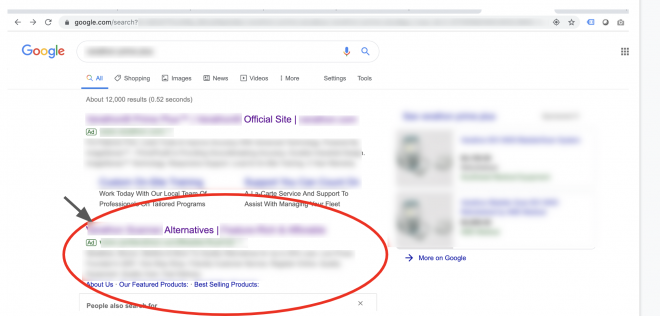The paid search community was recently caught up in a flurry of tweets on the topic of a certain “dirty trick.”
The CEO of Basecamp, Jason Fried, complained that Google Ads allows competitors to bid on a company’s branded keywords (including his own). He claims that the practice is cowardly and nasty — and implied that it’s a dirty trick.
Fried is right in that Google does allow competitors to trigger ads with protected brand keywords. However, Google doesn’t allow advertisers to display competitors’ protected marks. (Hat tip to Marty Weintraub for the clear explanation.)

In the ensuing twitterstorm, some people supported Fried’s position. But many pushed back on his charges of the practice being cowardly and nasty.
I’m sympathetic. It can be very frustrating when this kind of thing happens.
For example, we’ve had the headache of dealing with this ad recently:

The top ad is for our client. The ad below (circled in red) is for a competitor. The ad below isn’t advertising a superior product or even a different product. The company is an unauthorized reseller, and they’re advertising OUR CLIENT’S product, calling it an “alternative.”
Argh!
However, while I’m sympathetic to Jason Fried, I have some reservations.
Because, in fact, Google Ads provides more protection to advertisers than they strictly have to under the law. In the world of print advertising, for example, the FTC allows for comparative advertising, which Google Ads does not allow.
Regardless, the larger point that’s been missing from this debate is that there’s rarely a good reason to bid on competitor branded keywords at all.
Why You Shouldn’t Bid on Your Competitors’ Branded Keywords
There are two main reasons why you shouldn’t bid on your competitors’ branded keywords.
First, it can backfire. If you’re not careful, it can lead to a low quality score (QS). If you have a long-standing account with super strong QS across the board, you may be fine. But if you haven’t built that history, you may get yourself into trouble.
Second, if you’ve been taking care of your brand awareness, there’s likely no need to. When your brand awareness is strong, you’ve built up protection against this kind of tactic.
How to Protect Yourself Against Competitors
So what can you do to build your brand to protect your brand against his kind of “attack”? Make brand building an essential part of your ongoing strategy.
Here are some ideas on how to do it:
1. In-Market advertising
In-market audiences is a way to target people who’re actively researching or planning their purchases within certain predefined Google categories.
2. Custom intent on the GDN
Custom intent on the GDN hasn’t been around long. But it’s proving to be a great tool for brand building.
Custom intent audiences help you put your ads in front of people who’re looking to buy what you’re selling — and not just people who fall into a certain category (as with in-market advertising). With custom intent, you have the ability to customize your audience by adding keywords and URLs to get very specific in your targeting.
3. Remarketing
Remarketing is a very flexible tool for brand building. You can target people who have been to certain pages of your website or videos on your YouTube channel. Your ads can reflect your brand in general or promote specific products or services.
4. Video Ads
Video advertising is more engaging and memorable than most other types of media. It’s a great way to grab attention and build interest, which makes it perfect for brand building.
Lack of Brand Awareness Can Make You Vulnerable
When you haven’t built strong brand awareness, you leave yourself vulnerable to competitors, industry changes and even self-inflicted adjustments.
Two years ago, a client asked us to pause remarketing because they weren’t getting great ROI from it. Around the same time, the client rebranded the company with a new name.
This client is in the B2B conference industry, and a good portion of his customers are recurring. This made a name change potentially problematic. Would past customers be confused by the name change? If they wanted to work together again, would they even find the company under its new name?
One way to avoid these potential problems is through brand awareness. But unfortunately, the client refused to dedicate any part of his budget to brand building because he was only focused on performance metrics.
Fast forward two years and the company’s revenue is flat. Could brand building have made a difference here? I strongly believe so.
When a Competitor Pushes the Envelope
I’ve made the case for why you shouldn’t bid on competitor keywords and why you should build your brand instead.
But what if someone’s bidding on YOUR brand — and taking things too far? What if they’re not just bidding on your brand but infringing on your trademark?
- Start by filing a complaint. We’ve done this before for clients, and we’re often successful.
- Put “official site” in your ad headline. We’ve found that this strategy works really well to distinguish your ad from competitor ads.
- Keep building your own brand. I can’t say it often enough!
Use Brand Awareness to Protect Yourself Against Dirty Tricks in PPC
Some marketers will use every trick in the book to compete on Google Ads, whether permitted by Google Ads or not.
The best insurance policy you can have against this kind of behavior is a strong brand.
When your brand awareness isn’t strong, you’re more vulnerable to your competitors — whether they’re using dirty tricks or not.






